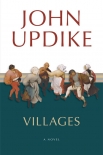Villages, John Updike [brene brown rising strong .TXT] 📗

- Author: John Updike
Book online «Villages, John Updike [brene brown rising strong .TXT] 📗». Author John Updike
Light perpetual, in a universe where, the latest scientific reports indicate, expansion, propelled by some unknown factor called the dark force, is accelerating to the point where the stars will eventually be invisible to one another. By other proven laws they will burn out and drift as meaningless ash-heaps of forever inert matter. No one follows the latest turns of empirical cosmology more keenly than the village clergyman, hoping for some peep, around a cryptic equation’s corner, of divine mercy. One of the burdens, as Owen sees it, that the modern faithful shoulder is the monstrously enlarged context of time. Saint Paul thought the last trumpet would sound within the lifetime of some living—“Behold, I show you a mystery; we shall not all sleep, but we shall all be changed, in a moment, in the twinkling of an eye, at the last trump”—and medieval men could still picture their intact skeletons clambering up, gumlessly grinning, out of their graves. The next world was around the corner, almost visitable, like the vaults beneath the cathedral floor. Now it must be relegated to another dimension, joining those subatomic strings whose mathematical invention may at last solve the riddle of existence: why did nothingness, the ground note of cosmic reality, the substratum that everlastingly endures, choose so troublesomely to violate itself and give birth to anything at all? The church in strategic retreat abandons the cosmos to physics, and takes refuge in the personal—the cosmos of fragile, evanescent consciousness. In that shadow-world, infinitely prolonged, Florence and Jameeka and Lara and Bruce consort, bathed in God’s indiscriminate love, and together mount from strength to strength. If after the manner of men I have fought with beasts at Ephesus, what advantageth it me, if the dead rise not? let us eat and drink; for to-morrow we die. In the next verse, Paul ominously adds, Be not deceived: evil communications corrupt good manners.
Owen and Julia, as it happened, befriended mostly older people when they moved to Haskells Crossing. Couples their own age, discovering that this polite middle-aged couple did not drink or know any local gossip, tended not to have them back after the first invitation to cocktails. The elderly, though, having arrived by way of illness or AA at their own renunciations, found the new “young” couple fresh and mannerly, and had them to seasonal parties where Owen and Julia were, save for grandchildren underfoot, the youngest guests present. In the cheerful crowd of these elders, jubilantly full of obsolescent lore, the great harvester was already active. Funerals became a familiar occasion—the Episcopal rite, stretched to accommodate informal, sometimes irreverent and hilarious, reminiscences by old friends and aging offspring. There would be a service leaflet, with anodyne verses on the back and in the middle the hymn numbers and prayers and on the front a fascinating photograph of the deceased in the fullness of life, at the tiller of his boat in Maine, or posed by a laden rose trellis, laughing in a sunshine whose neutrinos have reached the star Vega by now, or holding the bridle of a horse, itself deceased, displaying a wild eye and flaring brute nostril. Owen was fascinated by what constituted, for the rich, their happiest, summary moments. Country pleasures: millions of dollars organized into a quest for purity, for aboriginal innocence. Rarely was an indoor photo chosen, or one snapped in the course of a workday or a ceremony, a fortieth anniversary or a sumptuous retirement party. If the image was taken from the smooth-skinned youth of the recently dead, it was almost always in a sporting pose—in whites beside a tennis net, or holding a silver trophy with a smile no less bright. The afterlife, the implication was, would be a country club. After the service, the widow or widower or oldest child still in this locality would host a party, at the spacious former home or at the yacht club or the country club, where remembrance of the departed yielded to forgetful gaiety and bitter complaint of how the land-owning, tax-paying residents of Haskells Crossing were disadvantaged in their struggles with those corrupt, or just careless, and in any case petty politicians ensconced in the power chambers of Cabot City. The party, if this was a private home, would have in its view a sparkling slice of the sea, that omnivorous imperturbable image of the eternity that awaits each celebrant, each survivor.
One of the earliest acquaintances of the new Mackenzies—Mackenzies II, if marriages were movies, or, if computer programs, Mackenzies 2.1—had been Bumpy Wentworth, a small plump woman with thinning blue hair and a gift for mimicry. She had been called Bumpy in her girlhood, by an aggrieved younger brother with whom she was sharing, along with a substantial governess, the back seat of their father’s Peerless. Photographs from 1925, when she was ten, do attest to a pugnacious sisterly heft. She became a benign, comfortably proportioned woman, but the name travelled with her out from the nuclear family into day school, boarding school, finishing school, and marriage. In the conservative fashion of the region, where a genial male chauvinism labelled the tribal females like pets, “Bumpy,” with its connotation of “bumptious,” stuck. So did, among her peers in Haskells Crossing, the designations Muffin, Jonesie, Snuggles, and Bunch: these were all dignified women of means in their sixties or seventies.
Now, if Julia had any weakness, it was for light-hearted female friendship. She had been passed from her father, a New Haven banker and high churchman whose three other offspring were boys, straight to her husband, fresh from divinity school, as an exemplary woman: from model daughter and student into perfect helpmeet and homemaker without a break. The one slip of her life had been falling in love with Owen, which





Comments (0)